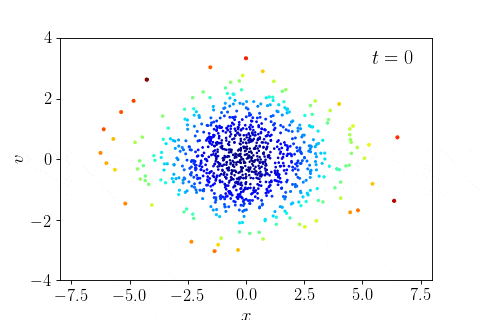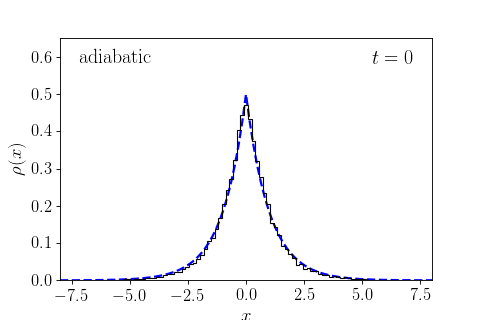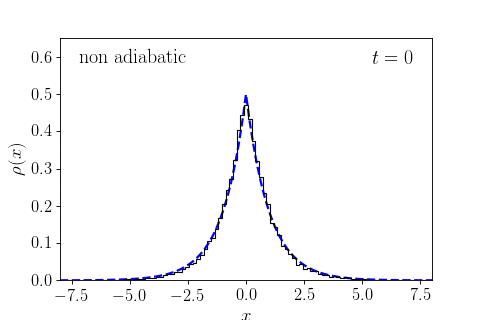https://github.com/jobovy/wendy
A one-dimensional gravitational N-body code
https://github.com/jobovy/wendy
astrophysics binder c n-body n-body-simulator physics python
Last synced: about 2 months ago
JSON representation
A one-dimensional gravitational N-body code
- Host: GitHub
- URL: https://github.com/jobovy/wendy
- Owner: jobovy
- License: mit
- Created: 2017-04-24T19:15:51.000Z (over 8 years ago)
- Default Branch: main
- Last Pushed: 2024-02-05T18:19:45.000Z (over 1 year ago)
- Last Synced: 2024-12-30T04:52:52.793Z (10 months ago)
- Topics: astrophysics, binder, c, n-body, n-body-simulator, physics, python
- Language: C
- Homepage:
- Size: 20.5 MB
- Stars: 19
- Watchers: 3
- Forks: 4
- Open Issues: 2
-
Metadata Files:
- Readme: README.md
- Changelog: HISTORY.txt
- License: LICENSE
Awesome Lists containing this project
README
# wendy
A one-dimensional gravitational N-body code.
[](https://github.com/jobovy/wendy/actions?query=workflow%3Abuild)
[](https://codecov.io/gh/jobovy/wendy)
[](https://pypi.python.org/pypi/wendy/)
[](http://beta.mybinder.org/repo/jobovy/wendy)
## Overview
``wendy`` solves the one-dimensional gravitational N-body problem to machine precision with an efficient algorithm [O(log N) / particle-collision]. Alternatively, it can solve the problem with approximate integration, but with exact forces.
## Author
Jo Bovy (University of Toronto): bovy - at - astro - dot - utoronto - dot - ca
## Installation
Install the latest release using
```
pip install wendy
```
or clone/fork/download the repository and install using
```
sudo python setup.py install
```
or locally using
```
python setup.py install --user
```
The behavior of the parallel sorting algorithm used when setting ``sort='parallel'`` in the approximate version of the N-body code (``approx=True``) is controlled by a few compilation-time variables: ``PARALLEL_SERIAL_SORT_SWITCH``, which sets the length of an array below which the serial sort is used, ``PARALLEL_SERIAL_MERGE_SWITCH``, which sets the length of an array below which a serial merge is used (as part of the ``mergesort`` sorting algorithm used), and ``PARALLEL_SORT_NUM_THREADS``, the number of threads used in the parallel sorting algorithm. By default, these are set to ``PARALLEL_SERIAL_MERGE_SWITCH=10000``, ``PARALLEL_SERIAL_MERGE_SWITCH=50000``, and ``PARALLEL_SORT_NUM_THREADS=32``, which appear to work well. Significant speed-ups can be obtained by optimizing these for your system and specific problem. They can be set to different values by running, e.g.,
```
export CFLAGS="$CFLAGS -D PARALLEL_SERIAL_SORT_SWITCH=10 -D PARALLEL_SERIAL_MERGE_SWITCH=10 -D PARALLEL_SORT_NUM_THREADS=2"
```
before compiling the code (if you are trying to change them, make sure to force a re-compilation by removing the ``build/`` directory).
## Usage
Use ``wendy.nbody`` to initialize a generator object for initial *(x,v)* with masses *m*. The generator then returns the state of the system at equally-spaced time intervals:
```
g= wendy.nbody(x,v,m,0.05) # delta t = 0.05
next_x, next_v= next(g) # at t=0.05
next_x, next_v= next(g) # at t=0.10
...
```
The generator initialization with ``wendy.nbody`` has options to (a) solve the problem exactly or not using ``approx=``, (b) include an external harmonic oscillator potential ``omega^2 x^2 / 2`` with ``omega=`` (both for exact and approximate solutions), and (c) include an arbitrary external force ``F(x,t)`` (using ``ext_force=``, only for the approximate solution).
## Examples
You can run these *without* installing ``wendy`` by clicking on [](http://beta.mybinder.org/repo/jobovy/wendy) and navigating to the ``examples/`` directory. Note that some of the movies might fail to be rendered on the binder webpage, so you might want to skip those when running the notebooks (or changing the ``subsamp`` input for them).
* Phase mixing and violent relaxation in one dimension: [example notebook](examples/PhaseMixingViolentRelaxation.ipynb) (run locally to see movies, or view on [nbviewer](http://nbviewer.jupyter.org/github/jobovy/wendy/blob/main/examples/PhaseMixingViolentRelaxation.ipynb?flush_cache=true))


* A self-gravitating, sech2 disk: [example notebook](examples/SelfGravitatingSech2Disk.ipynb) (run locally to see movies, or view on [nbviewer](http://nbviewer.jupyter.org/github/jobovy/wendy/blob/main/examples/SelfGravitatingSech2Disk.ipynb?flush_cache=true))


* The _Gaia_ phase-space spiral: [example notebook](examples/GaiaPhaseSpaceSpiral.ipynb) (run locally to see movies, or view on [nbviewer](http://nbviewer.jupyter.org/github/jobovy/wendy/blob/main/examples/GaiaPhaseSpaceSpiral.ipynb?flush_cache=true))


* Adiabatic contraction: [example notebook](examples/AdiabaticContraction.ipynb) (run locally to see movies, or view on [nbviewer](http://nbviewer.jupyter.org/github/jobovy/wendy/blob/main/examples/AdiabaticContraction.ipynb?flush_cache=true))


* Adiabatic vs. non-adiabatic energy injection for an exponential disk: [example notebook](examples/AdiabaticVsNonAdiabatic.ipynb) (run locally to see movies, or view on [nbviewer](http://nbviewer.jupyter.org/github/jobovy/wendy/blob/main/examples/AdiabaticVsNonAdiabatic.ipynb?flush_cache=true))


* ``wendy`` scaling with particle number: [example notebook](examples/WendyScaling.ipynb) (view on [nbviewer](http://nbviewer.jupyter.org/github/jobovy/wendy/blob/main/examples/WendyScaling.ipynb?flush_cache=true))